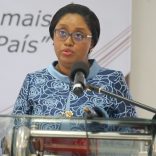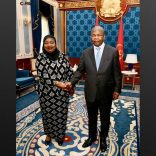Mozambique: New road tolls take effect - AIM report
Mozambique’s economic environment is challenging – prime minister

File photo / Prime Minister Carlos Agostinho do Rosário
Prime Minister Carlos Agostinho do Rosário acknowledged yesterday that, despite some improvement, the country’s economic situation remained a challenge that required more measures to reduce inflation and resume economic growth.
“It is our belief that with the reduction of inflation, interest rates will fall, which will ease the cost of financing investment, thus boosting our economy, especially small and medium-sized enterprises,” he said at the official opening of the 13th annual conference and 14th annual general meeting of the Organisation of Public Accounts Commissions of the Southern African Development Community (SADCOPAC), which runs until Saturday in Maputo.
According to the Mozambican prime minister, annual inflation fell from 26 percent in November 2016 to about 14 percent in August this year – which was still high, he acknowledged – and the goal was to reduce it to single digits, thereby reducing the cost of living and improving access to finance.
“After having gone through very difficult times in 2015 and 2016, our economy is showing signs of recovery. This year it grew by an average of 3 percent in the first and second quarters, having registered growth of 1.1 percent in the last quarter of 2016, the lowest rate in recent years,” he said.
This pace of economic recovery “leads to the prospect of a growth rate of 4.7 percent in 2017”, he added. “[In 2018] we expect our economy to grow by 5.3 percent and, starting in 2019, to resume economic growth levels of 6 to 7 percent.”
The prime minister linked the 2018 economic growth forecast to the ongoing peace process, the performance of the agriculture and extractive industries and the transport and communications sectors.
As to the disappointing trajectory of the Mozambique economy in particular and the SADC in general in 2015 and 2016, he attributed it to the fall in prices of the main export products in the international market and to the El Niño effect causing the drought that hit agriculture.
Addressing the SADCOPAC meeting, Mozambican parliamentary speaker Verónica Macamo called for urgent improvement of the anti-corruption and misappropriation mechanisms in SADC member countries.
She said it was imperative to improve procurement procedures, accountability and internal controls and audits, bolstering transparent and rational management of public funds.
It was also necessary, she said, to make parliamentary supervision more visible.
“Today we live in a more educated and informed society in which the citizen follows the actions of the government and organs of state, and wants to be sure that his taxes are being spent for the purposes for which they were allocated under a plan approved by the competent bodies,” she said.
Macamo stressed that SADC member countries were committed to promoting sound public policies and institutional capacity-building in the public sector to combat poverty and endemic diseases such as AIDS, malaria and cholera, as well as to build capacity to deal with the effects of natural disasters, and reduce external dependence.
“Overcoming these challenges will allow us, in the medium and long term, to raise our countries to ‘middle income’ level, but we need balanced and sustainable public finances,” she said












Leave a Reply
Be the First to Comment!
You must be logged in to post a comment.
You must be logged in to post a comment.